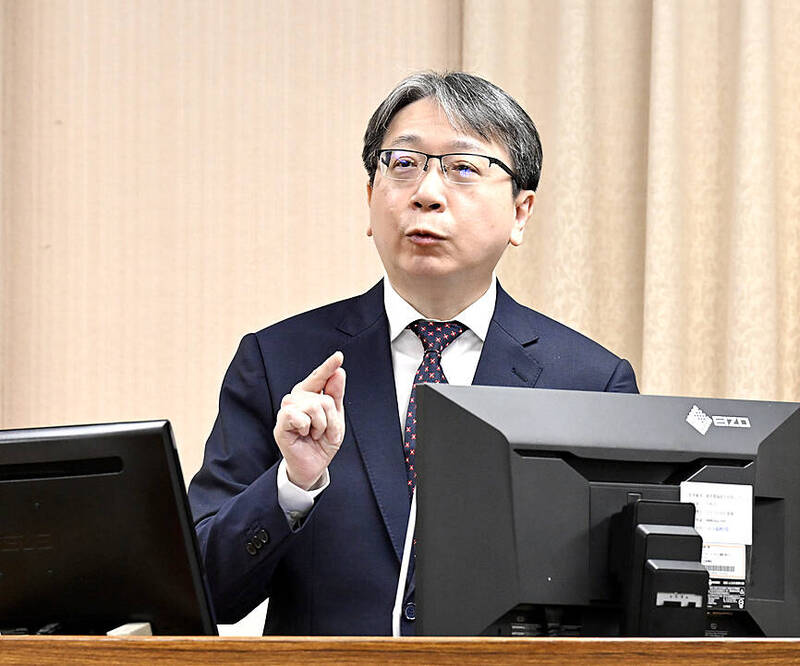《TAIPEI TIMES》Beijing’s cross-strait policy ‘coercive’

Gymnast Lee Chih-kai, right, shows off his gold medal next to his coach, Lin Yu-hsin, at the Artistic Gymnastics World Cup series in Baku on Sunday. Photo: CNA
INSTILLING FEAR: China is ramping up its coercion campaign through military, economic, political and information security threats, as well as cognitive warfare, Tsai Ming-yen said
By Liu Tzu-hsuan / Staff reporter
Beijing’s strategy of peaceful unification with Taiwan is coercive in nature, National Security Bureau Director-General Tsai Ming-yen (蔡明彥) said yesterday, adding that no intelligence indicates that tensions in the Taiwan Strait are rising.
Chinese policies have been centered on peaceful unification, as shown by the passage of a resolution at the Chinese Communist Party’s (CCP) Chinese People’s Political Consultative Conference, Tsai said during a meeting of the legislature’s Foreign Affairs and National Defense Committee.
While continuing to oppose Taiwanese independence, promote unification and integration with Taiwan and oppose external interference in cross-strait issues, Beijing is ramping up its coercion campaign against Taiwan through military, economic, political and information security threats, as well as cognitive warfare — which Tsai called “peaceful unification by coercion.”
The effort is to instill fear in Taiwanese about a possible military invasion, but is still generally in line with a policy of pursuing peaceful unification, he said.
The National Security Bureau is working closely with the Ministry of National Defense and national security agencies to monitor Chinese military developments, taking into account multiple factors that could influence cross-strait ties, he added.
Chinese military intimidation against Taiwan has become normalized — a combat readiness patrol is conducted every seven to 10 days, with about 10 fighter jets, other aircraft and three to four warships operating in the Taiwan Strait, Tsai said.
Taipei has had “discussions” with international allies on whether a Chinese invasion is imminent, but tensions across the Taiwan Strait have not escalated sharply, he said.
There is “currently no intelligence indicating an imminent war in the Taiwan Strait,” Tsai said, adding that the government would continue to monitor the situation and respond accordingly to avoid escalating tensions and to maintain stability in the strait.
Beijing also uses such military patrols as a respone to Taiwan interacting with other nations, threatening the nation whenever pro-Taiwan resolutions are passed by foreign parliaments, foreign ships patrol the Taiwan Strait and foreign politicians visit Taiwan.
In addition to intimidation by force, China also engages in cognitive warfare such as spreading controversial information to divide society, Tsai said.
To counter Chinese carrot-and-stick tactics against Taiwan, it is important to strengthen the nation’s defense by modernizing weapons and hardware; ensuring supplies of energy and food; and building social resilience, he said.
The All-Out Defense Mobilization Agency is drawing up plans to enhance the nation’s all-out defense capacity, which is one of the lessons learned from Russia’s invasion of Ukraine, he added.
Tsai said that Beijing would probably continue its carrot-and-stick approach to Taiwan ahead of president-elect William Lai’s (賴清德) inauguration in May, including boosting relations with Taiwanese who favor closer ties with China while stepping up displays of force.
Beijing would continue its efforts to limit Taiwan’s international participation by promoting its “one China” principle around the globe in a bid to influence the new administration’s cross-strait policy, he said.
Beijing could implement the amended Law on Guarding State Secrets on May 1, which Tsai said his bureau is monitoring due to the increased risk of doing business with and traveling to China.
The amendment, passed last month, widens the scope of restricted sensitive information to include information that is not a state secret, but would cause adverse effects if leaked.
The government would monitor the situation, including maintaining good communications with Taiwan’s diplomatic allies, he added.
Additional reporting by Reuters
新聞來源:TAIPEI TIMES










